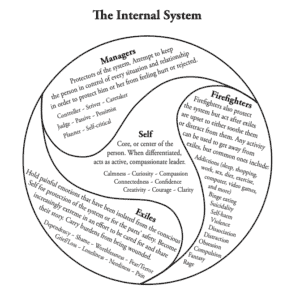Internal Family Systems (IFS)
“Internal Family Systems (IFS) therapy is a synthesis of two paradigms: the plural mind, or the idea that we all contain many different parts, and systems thinking”
– IFS 2nd ed., Schwartz and Sweezy.
The theory of IFS suggests that we have been thinking about the human personality in very unhelpful ways in the past: We have been thinking that the person is a singular, monolithic thing when in fact, who you are is a system of parts. So, IFS posits that who you are as a person is not a singular self but more a systems of selves that function together in a relational way, sort of like a family. Members of a family can disagree with each other, and pull in different ways, and sometimes they are in harmony, and often they are not. Each of us is more like this than we think. Part of you likes to exercise, part of you prefers to watch TV; part of you may be sad and want to isolate, and another part of you may simultaneously be reaching for company and comfort. To speak like this is natural to us, and the IFS model recognizes this internal diversity and has developed a system of therapy that can work with the dynamics of our parts in order to bring healing, integration, relief from tension, and clarity to possibly every diagnosis that we find in mental health.
In the therapy of IFS, we can discern, talk to, understand and heal parts of self by meeting them, listening to them, interacting with them in new ways, and bringing them what they have lacked.
In IFS, we see a few broad categories of parts:
– Managers/ Protectors: these are parts of self that are interested in strategies that control the internal and external envionrment to keep things safe.
– Exiles: these are hurt parts of ourselves that carry wounds and traumas from the past, and they are generally hidden and protected by managing parts.
– Firefighters: these are parts that protect us when our wounds are activated and the managing protectors are have failed to avert the pain. Firefighter parts are often considered the ‘real problems’ as they show up like unwanted habits, addictions, and unhelpful avoidance strategies.
And lastly, the key that makes all of this possible is what IFS calls the ‘Self’ (capitol S) which is not a part but the open, caring and compassionate space which holds all our parts together, much like the space of a room holds all the objects of the room. And much like many concepts of the essential self or soul that are found in the mystical and spiritual traditions of the world, which aligns IFS with a much greater worldview, if one wants to.

What is amazing about IFS is that what we have previously called “pathologies” and named in all our diagnoses, we now can see are just the dynamics of protective systems. What we saw before as ‘resistances’ we now see as managerial parts of self. And when we are able to meet our parts with understanding and care, we see that the source of all the healing we ever needed is inside us, waiting for us to plug in and direct it to the hidden corners of our mind.
An IFS-informed therapist can help you to locate, and work with the parts of you that are causing whatever problems you are seeing in your life. Like turning on a spotlight and directing it to a dark corner of the room, we can facilitate healing in a new way that you can learn and take with you as permanent shifts in your internal dynamics.
IFS is finally giving us a therapy that is not a mere “band-aid”, nor a bunch of tedious homework exercises. It can bring us lasting and significant changes to our whole personality structure, getting to the real roots of our problems in surprising and often very enjoyable ways. And most exciting is that not only can IFS effectively treat common Trauma, but it can treat attachment trauma – which almost any therapist will tell you is the greatest problem facing modern therapy.
Several of us here at Wise Path Counselling are using IFS-informed practices to deepen our capacity to not just help, but heal in therapy. And excitingly, it can be used in conjunction with EMDR in many cases for finding healing and relief from trauma in a way that just a couple decades ago psychologists were only dreaming about.
For more information about IFS, check out Rob’s blog posts and follow some of the links to official web sites about IFS.






